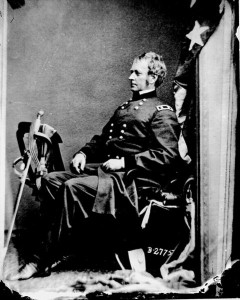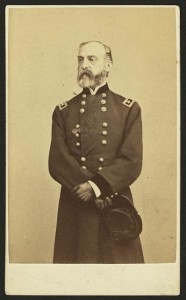My jaw pretty near dropped. One of the Democrat newspapers from Seneca County, New York had a smidgen of praise for President Lincoln in this editorial printed in July 1863:
Exit Fighting Joe Hooker.
The President, trembling with fear and humiliated by the invasion of Pennsylvania, has deposed Major-General JOSEPH HOOKER from the command of the Army of the Potomac, substituted in his stead Gen. GEORGE G. MEAD [sic]. The removal of the incompetent and boastful HOOKER is one step in the right direction. The President should go a little further and rid himself of STANTON, HALLECK and the entire crew of malignants and imbeciles which surround him. We should then have some hope of saving the Union. But the President does nothing except from sheer necessity. Since HOOKER re-enacted BURNSIDE on the heights of Fredericksburgh, the people required nothing further to convince them of his utter inefficiency as an officer. He neither evinced tact, strategy nor courage in that bloody and unnecessary conflict, and he should have been promptly relieved from command at the conclusion of the struggle. Instead of this, however, the Secretary of War, in a boastful and lying letter, assured the country that the army had not been worsted, and would forthwith assume the offensive. What is the result? Gen. LEE, thoroughly satisfied with “Fighting Joe’s” incompetency, has improved the opportunity to invade Maryland and Pennsylvania, and through all his recent rash movements he has exhibited his estimate of HOOKER’s capacity. He has outgeneraled him at every point, and the latter has done nothing to stop the progress of the enemy into Pennsylvania. HOOKER’s retirement could no longer be delayed, and why the Administration waited until our army were brought face to face with the enemy, before he was removed, is a question which will be better understood when the curtain is raised and the public are allowed to understand the facts.
Gen. MEAD, to whom the destinies of our people are now entrusted, is comparatively an unknown officer. He has been in command of the Fifth Army Corps for some time past, was with MCCLELLAN during the Peninsula campaign, and has the reputation of being a modest, unassuming, faithful soldier. He has assumed a fearful responsibility, and it remains to be seen how well he will discharge it. Let us hope that he is “the right man in the right place.”
General Hooker gave his endorsement. From the Richmond Daily Dispatch July 4, 1863:
Farewell address of Gen. Hooker,
The following is Gen. Hooker’s farewell address to the Army of the Potomac:
Head’qrs Army of the Potomac, Frederick, Md., June28, 1863.
General Orders, No. 65.
In conformity with the orders of the War Department, dated June 27, 1863, I relinquish the command of the Army of the Potomac. It is transferred to Major General George G. Meade a brave and accomplished officer, who has nobly earned the confidence and esteem of the army on many a well-fought field. Impressed with the belief that my usefulness as the commander of the Army of the Potomac is impaired. I part from it, yet not without the deepest emotion. The sorrow of parting with the comrades of so many battles is relieved by the conviction that the courage and devotion of this army will never cease nor fail; that it will yield to my successor, as it has to me, a willing and hearty support. With the earnest prayer that the triumph of its arms may bring successes worthy of it and the nation, I bid it farewell.
Joseph Hooker, Major-General.
The Herald, in a double-headed editorial announces the retirement of Gen. Hooker and the appointment of Gen. Meade “with no ordinary feelings of gratification.” It enlogizes Gen. Meade’s military qualifications and forbears to “deal harshly” with Gen. Hooker, who has displayed his patriotism by requesting to be relieved of the command of the Army of the Potomac.
A telegram from headquarters says that “nothing could have exceeded the surprise occasioned by this announcement”–the change of commanders. “Gen. Hooker was deeply grieved,” etc.


